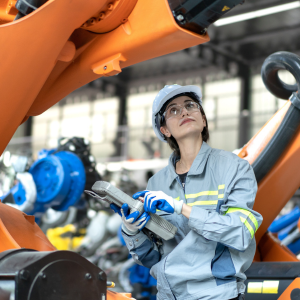Manufacturing
Recent Posts
The Role of AI/ML in Industry 4.0
Post By: Ryan King On: 18-04-2024
Artificial Intelligence (AI) is a branch of computer science that has developed a processing system capable of behaving like human intelligence. It can perform reasoning, calculation and analytical tasks and learn from these to improve...
How to Prepare Your Workforce for Industry 4.0?
Post By: Holly Shaw On: 12-04-2024
Manufacturers are facing ongoing pressure to change their business and production models. Industry 4.0 and the adoption of tech initiatives take centre stage, but you also need to remember the people who will use them...
The Role of Quantum Computing in Manufacturing
Post By: Ryan King On: 05-04-2024
Technological advances have emerged from Industry 4.0, but quantum computing will take the fourth industrial revolution to a whole new level. Although it’s still in its infancy, researchers and business leaders are already exploring...
Why Data is Important in Industry 4.0?
Post By: Harry Richardson On: 29-03-2024
Advanced Industry 4.0 technologies have created a marked change in business practice. Business intelligence now helps manufacturers achieve production excellence by collecting, analysing and managing the huge volumes of data...
How Industry 4.0 Is Changing Quality Assurance
Post By: Holly Shaw On: 22-03-2024
Industry 4.0 is becoming too generic for the various aspects of technological change in the 2020s. Perhaps we should consider things like design, manufacturing, maintenance and inspection as separate sectors, which all work together to...
Get More Manufacturing Content From Rowse Straight To Your Inbox
Welcome to Manufacturing at Rowse, where we'll provide you with regular news and industry updates for the world of manufacturing. Rowse has been in business as an electrical wholesaler for over 15 years. During this time, our experienced engineers and design teams have become acquainted with all types of manufacturing. We are a family-based company with wide-ranging interests and practical expertise, and you can always find a knowledgeable team member at Rowse to advise you.
What Is Manufacturing?
In the literal sense, the word "manufacture" is of Latin origin, and means made (factum) by hand (manu). Historically, therefore, manufacturing began at the moment that a human hand first transformed raw materials into a useful product. This could have been as simple as knapping flints to make cutting tools, or weaving raw fibres into a garment or basket. Many things are still made by hand, including textiles, ceramics and wooden furniture, but the majority of modern manufacturing takes place with the aid of machines.
Since the Industrial Revolution in the 1760s, and the harnessing of steam power that developed throughout the 18th century, machinery has taken the weight of manufacturing out of human hands. From the beginning, entrepreneurs in manufacturing industries were keen to get the work done faster, cheaper and more efficiently. Machines, being much stronger and more durable, also enhanced manufacturing potential far beyond human abilities. They could lift heavier loads, pump fluids for long periods without interruption, and, perhaps most importantly, produce and replicate an item exactly with endless repetition. Manual labour is still involved, but mostly for the operation of machinery, and many factory applications have now been automated.
Manufacturing today is a large-scale enterprise, converting all kinds of raw materials into finished merchandise, and representing 15-20% of the world's economy. Manufactured goods can be purchased directly by consumers, or by wholesalers like ourselves, who distribute them to retailers. They may also be supplied to other manufacturers who will use them to produce more complex manufactured products.
How Can Rowse Help With Manufacturing?
The team at Rowse is always on the lookout for any technological developments or market innovations in manufacturing. We are a recognised distributor of many automated systems and individual components, and we have the expertise to supply and service many different types of equipment. Our team is always happy to conduct a site visit and consultation for setting up and/or improving your existing systems. We can field experts in system design, machine safety, pneumatics and automation. They can carry out a risk assessment exercise on your premises, ensuring that all equipment is performing optimally, and in full compliance with standards and safety regulations.
We are also premier stockists and authorised distributors for many leading manufacturers, such as Siemens and Harting. Our extensive product portfolio covers many specialist areas, including industrial electrics, lighting, pneumatics, automation/control and safety. We have special expertise in sourcing parts, both current and obsolete, and we’ve created a handy product search tool to find what you need, fast. Whatever your manufacturing needs, Rowse is here to help.





